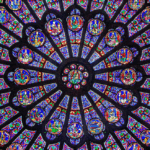
To renounce immutable truth does not convert falsehood into truth. To deny God is not to destroy Him. And to deny human depravity is not to achieve human perfection.
Once faith in the living God has declined, it is natural that unbelief will soon prevail over the dead fragments of doctrine so carefully embalmed in theological treatises. Despite the efforts of those who are glad to rescue half the truth, the whole truth will successively be banned: no mysteries, no Christ, no Bible, no Revelation, no God! Under the common label of ?pietism? Christianity, Judaism and Deism alike will be held up for contempt.
But the human heart cannot acquiesce in this. Unwilling or unable, however, to turn to God, it is doomed to sink ever deeper into the abyss. How will that be possible? In two ways.
Temporal Interests and Sensual Pleasures
First, it will try as much as possible to get rid of every notion of the Divine. Exhausted by the interminable battle of opinions and systems, and convinced as little by the arguments of skepticism as by the sophisms of irreligion, man seeks truth no more. Equally indifferent to error and truth, he will devote himself to temporal interests and sensual pleasures and be tolerant of anything so long as it does not interfere with the pursuit of earthly goods and earthly peace.
Superstition and Idolatry
A second reaction turns to superstition and idolatry. ?Make us gods, which shall go before us.? People do as Voltaire said, ?If God did not exist one would have to invent him.? But what will that invented deity be like, that idol not of wood or stone but of the vain imagination, of the short-sighted intellect, the corrupted heart and the excited emotions? Toward the end of the previous century, an astute student of philosophy, Lichtenberg, observed that ?the world will reach such a high level of sophistication that it will be as ridiculous to believe in God as it is today to believe in ghosts,? adding caustically: ?The day will come when we shall believe only in ghosts.? And indeed, men have actually gone this far in philosophy. Having denied the God of Revelation, they bow to the phantasms of the philosophical brain, to chimeras without number. Such monstrous wisdom will always be the product of human ingenuity when it refuses to acknowledge the God who has made Himself known in His twofold revelation, in the realm of nature and the realm of grace.
Then the Apostle?s word applies with double force: ?Because that, when they knew God, they glorified him not as God, neither were thankful; but professing themselves to be wise, they became fools, and changed the glory of the uncorruptible God into an image??this time not made with hands but formed by corrupted Reason, so that in this creature of their imagination they worshipped themselves ?more than the Creator, who is blessed for ever.?
The Final Outcome
Such is the final outcome of the theory of unbelief in the matter of religion: a pursuit of irreligion which, while it is contradicted by the heart, dissipates itself either in complete oblivion of God or in the most absurd representations of the Godhead. Is there no longer any deliverance, then, for the man who has turned away from God? Only if it pleases God to cause a great light to shine upon the people that walks in darkness.
With men this is impossible, but all things are possible with God.
This post is adapted from ?Lecture X: The Conflict with Nature and Law? from Unbelief and Revolution by Guillaume Groen van Prinsterer and translated by Harry Van Dyke (Lexham Press 2018). Read Bruce Ashford’s review of Unbelief and Revolution.





